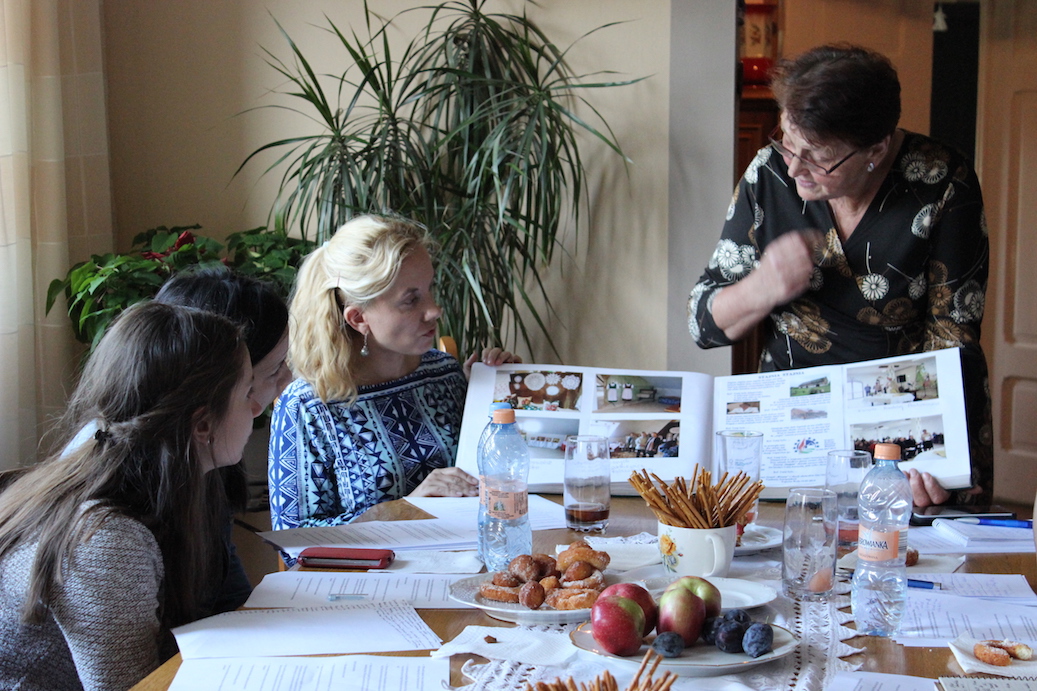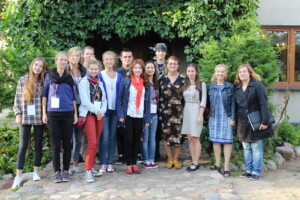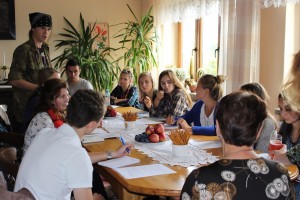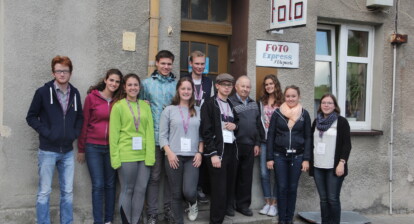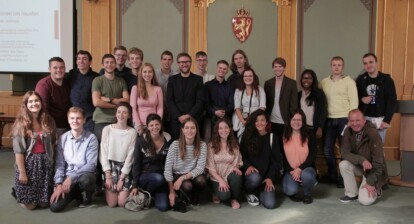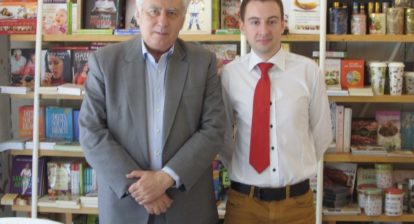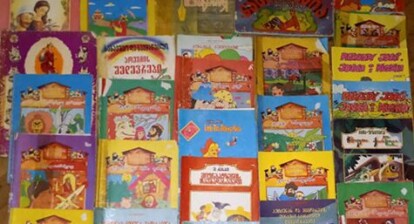Talking to average and ordinary people is boring? Andreyan from Bulgaria tells about the metamorphosis of his attitude after meeting a 70-year-old women from a Polish village.
“Adaptability is not imitation.
It means power of resistance and assimilation.”
Mahatma Gandhi
Unexpected Encounters
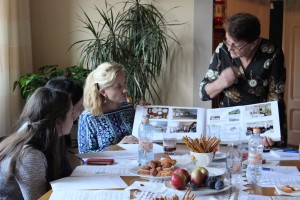
Mrs. Kłobuszańska lines her vivid talk with photos and documents from her past (Photo: Karolina Kaleta/Körber-Stiftung).
When our bus took a sharp left turn, I was certainly not ready for what was about to happen. My first shock was the dirt road. In year 2015, in Europe there was still an actual settlement, whose only connection to the rest of the world did not have the slightest trace of asphalt. Unbelievable! The bumpy ride also really got on my nerves. I was out of my comfort zone and all that bumping jumbled my thoughts.
We were headed to a remote village where Mrs. Kłobuszańska lived. Just as there was no proper road to her house, I expected that she would not have a proper connection with reality. I smirked at the thought of a narrow-minded old lady living in her fortress, built upon nostalgia for the past, slowly drifting away towards the comfort of the well-known history, as far as possible from the noisy, vivid reality. Little did I know…
A Journey Through Time
When we finally arrived at her house, the first impression I got was a positive one. It was a nice place, rather spacious with a nice big garden full of fruit trees and toys for kids. The interior of the house reassured my nostalgia-fortress expectations, though the walls were a bit brighter than expected.
There were all these old things, call them artifacts if you will, that screamed: “I am from the past!” I imagined the stuff talking with me: “Hello there, I am a lamp and I was born in communist times.” or “Hey look at me! I come from the GDR.” and even “Hey, I am here just to remind that somebody has been to the USSR!” An image that stuck in my mind was the old Singer sewing machine in the corridor, right next to the main entrance. It appeared as if it was not being used anymore, yet it was there. It felt sort of like its only purpose left was to stare at you and smile bluntly like a person from an old picture.
If I only knew that life had presented me a situation, which now definitely feels like a movie, I would have been super excited when I sat down at the old, long, wooden table. However, I did not know better so at that point of time I was already dreading about not switching to the other group, which was going to interview a person with real memories from the Second World War and not just vague child memories.
The Beginning
A ray of hope.
As the interview started I was more focused on everything around me, but the interview subject. The people asking questions were very nervous. The situation was quite awkward and the translation was rather dry. In order to show you the awkwardness of the situation I will list the “dry” facts we learned in the initial part of the interview:
- Mrs. Kłobuszańska was born on 3th of April 1945.
- They moved to Mazury in 1947.
- She had 3 brothers and 2 sisters.
- Her father was a driver.
- Her mother was the maid in the kitchen of a big farm.
- Mrs. Kłobuszańska wanted to be a nun or a bartender.
- She has 6 kids and 16 grandchildren.
- However, she remained a housewife.
- Started participating in different community activities, most of which she led.
- …
Unexpected Depths
The list went on and on, but I was impressed that Mrs. Kłobuszańska started talking more than she was asked. She looked confident and at ease. She cracked a few jokes, which I got that were jokes because the Polish-speaking people laughed. She appeared experienced in this kind of situation. I wasn’t sure if it was actually so, but I was looking for something to grab my attention. I felt like a drowning man, trying to clutch at a straw.
She continued telling us stories from her past, full of sentiment. The nostalgia of the carefree childhood years, where you could just run around, and play hide and seek. My fertile imagination was working. I could imagine the hot August night in the farm. Children running around and playing with whatever they could find. Sticks became everything from a horse to a sword. They might have been poor, but they were happy as they evaluated life differently. Allthough it was vivid, it was also something I expected. So I started feeling like my straw is breaking and I need a new one. And then not just a straw but a whole bunch of them was thrown at me.
“I am the free spirit!”
The sentence came out of the blue. Broad and interesting, yet so inappropriate compared to my expectations. Now I was certainly paying attention to Mrs. Kłobuszańska’s story. I focused on her body language. It is surprising how much you can understand just by watching the gestures and listening to the tone of a person’s voice. It was clear that she smiled tenderly when she said that her parents did not discuss politics with the children. It appeared as if she was trying to say “They were naïve to think that we did not notice everything. We knew stuff and that was dangerous, since children cannot keep their mouths shut.” She was very certain that her parents had no regrets about moving to Mazury. Now, when I am writing this and evaluating the situation, I conclude that there was also a slightly noticeable gratitude for their decision in her voice.
Stories of Survival and Forgiveness
She also shared a story about her mother-in-law and her sister, who both suffered from the advance of the Red Army. The sister was raped and died. The soldiers kept taking their crops. Those were extremely harsh times. However, there was one soldier who took some of the crops and said to her mother-in-law: “I have enough to survive. I suggest you hide the others, so you also have something to eat and survive. Otherwise, another soldier will come and he will take everything you have.” The pain and the disgust in Mrs. Kłobuszańska’s voice were obvious. However, at the end of this story she gracefully – as a sort of pardon for the stereotypes about nations – and firmly said:
“There are no evil nations. Only evil individuals!”

